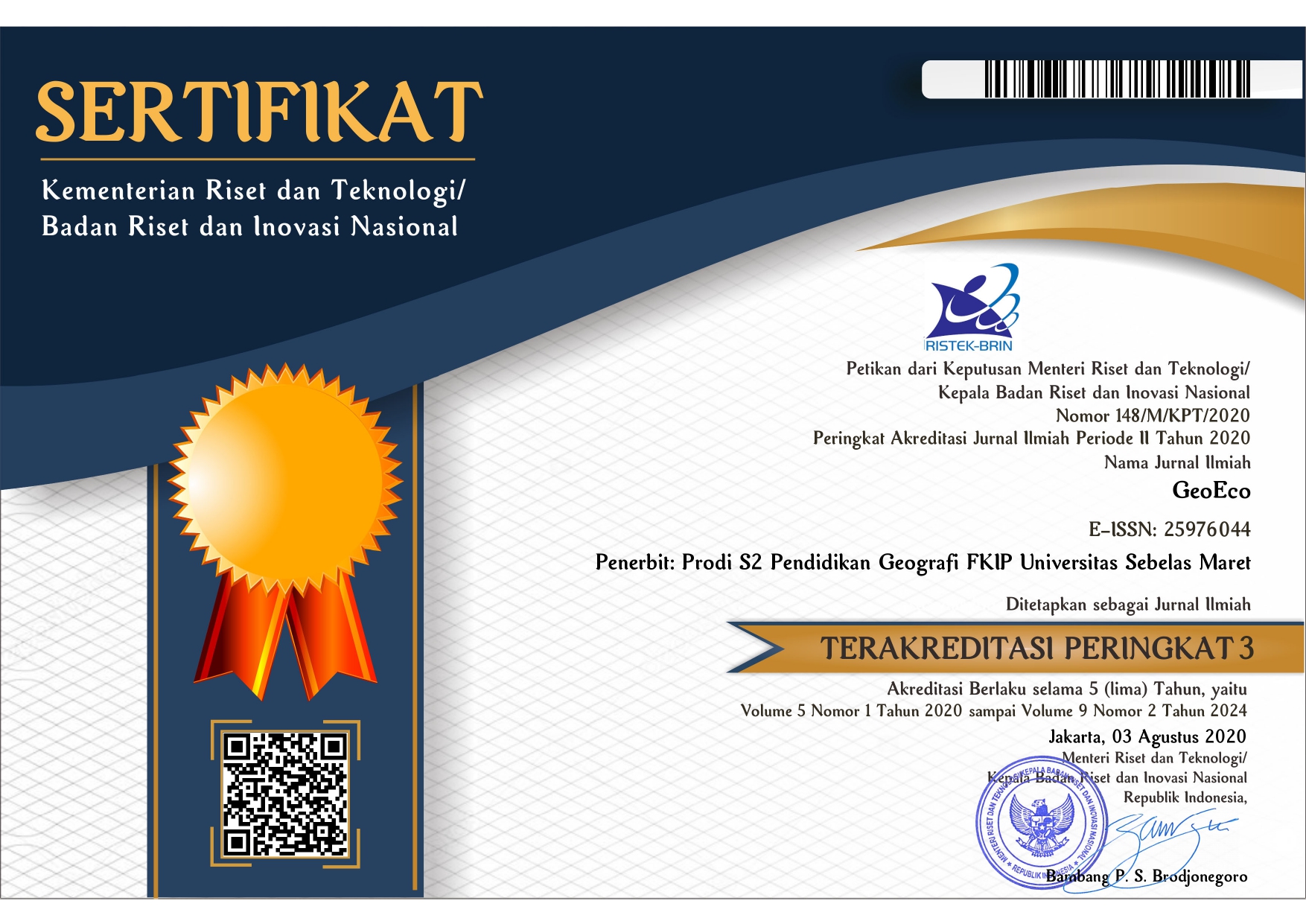PEOPLE PERCEPTION AND PARTICIPATION IN DISASTER RISK REDUCTION AT SURAKARTA CITY, CENTRAL JAVA, INDONESIA
Abstract
The research was aimed to determine (1) people knowledge level for the flood risk in Surakarta; (2) people perception of the flood risk in Surakarta; (3) community participation in the flood management in Surakarta. The city of Surakarta was chosen as the research location since this area was commonly flooded in rainy seasons and even in one year there can be floods repeatedly. Data collection methods used was field observation, structured interview and FGD. Data analysis was done by scoring. The results showed that: (1) Surakarta resident knowledge of the flood risk was in the high category. They can independently adapt to the flood disasters that often hit their area; (2) People perceptions of the flood risk disaster were in the high category. This was due to the Early Warning System (EWS) and the Search and rescue (SAR) teams information system which were well managed and easily accessed, (3) People participation in flood disaster management in Surakarta was in the "medium" category. The people participation in funding contributions and community service activities was high. However, the participation in the maintenance of water pumps, floodgates and river embankments was low.
Keywords
Full Text:
PDFReferences
Di Baldassarre, G., Martinez, F., Kalantari, Z., & Viglione, A. (2017). Drought and flood in the Anthropocene: Feedback mechanisms in reservoir operation. Earth System Dynamics, 8(1), 225–233. https://doi.org/10.5194/esd-8-225-2017 Du, J., Qian, L., Rui, H., Zuo, T., Zheng, D., Xu, Y., & Xu, C. Y. (2012). Assessing the effects of urbanization on annual runoff and flood events using an integrated hydrological modeling system for Qinhuai River basin, China. Journal of Hydrology, 464–465, 127–139. https://doi.org/10.1016/j.jhydrol.2012.06.057 Grothmann, T., & Reusswig, F. (2006). People at risk of flooding: Why some residents take precautionary action while others do not. Natural Hazards, 38(1–2), 101–120. https://doi.org/10.1007/s11069-005-8604-6 Huq, S. M. S. (2016). Community Based Disaster Management Strategy in Bangladesh: Present Status, Future Prospects and Challenges. European Journal of Research in Social Sciences, 4(2), 22–35. Inan, D. I., & Beydoun, G. (2017). Disaster Knowledge Management Analysis Framework Utilizing Agent-Based Models: Design Science Research Approach. Procedia Computer Science, 124, 116–124. https://doi.org/10.1016/j.procs.2017.12.137 IPCC. (2012). Managing The Risks of Extreme Events and Disaster to Advance Climate Change Adaption. In Cambridge University Press. Cambridge University Press. https://doi.org/10.1017/CBO9781139177245.009 Manik, T. K., Rosadi, B., & Nurhayati, E. (2014). Mengkaji dampak perubahan iklim terhadap distribusi curah hujan lokal di Propinsi Lampung. Forum Geografi, 28(1), 73–86. Mcdonald, L. A. (2018). Worldwide Waters : Laurasian Flood Myths and Their Connections. Georgia Southern University. Murase, M., Tyagi, A. C., Saalmueller, J., & Nagata, T. (2008). ORGANIZING COMMUNITY PARTICIPATION FOR FLOOD MANAGEMENT A Tool for Integrated Flood Management. Management, ORGANIZING(March 2008), 1–10. http://www.apfm.info/pdf/ifm_tools/Tools_Organizing_Community_Participation_for_FM.pdf Nardi, F., Annis, A., Baldassarre, G. Di, Vivoni, E. R., & Grimaldi, S. (2019). GFPLAIN250m, a global high-resolution dataset of earth’s floodplains. Scientific Data, 6, 1–6. https://doi.org/10.1038/sdata.2018.309 Prosdocimi, I., Kjeldsen, T. R., & Miller, J. D. (2015). Detection and attribution of urbanization effect on flood extremes using nonstationary flood-frequency models. Water Resources Research, 51, 4244–4262. https://doi.org/10.1111/j.1752-1688.1969.tb04897.x Putri, I. A. P., Dalimunthe, S. A., & Prasojo, A. P. S. (2019). The Right to Live Dangerously: Public Perceptions of Extreme Water Events in Urban Areas. 2nd International Conference on Strategic and Global Studies (ICSGS 2018), 365. https://doi.org/10.2991/icsgs-18.2019.5 Rajeev, M. M. (2014). Sustainability and Community Empowerment in Disaster Management. International Journal of Social Work and Human Services Practice, 2(6), 207–212. Ridolfi, E., Albrecht, F., & Di Baldassarre, G. (2020). Exploring the role of risk perception in influencing flood losses over time. Hydrological Sciences Journal, 65(1), 12–20. https://doi.org/10.1080/02626667.2019.1677907 Sinha, A. (2016, November 9). World Meteorological Organisation assessment: 2016 set to be warmest ever. The Indian Express. https://indianexpress.com/article/india/india-news-india/climate-change-global-warming-world-meteorological-organisation-assessment-2016-set-to-be-warmest-ever-c4365064/ Sipayung, S. B. (2009). Analisis Variasi Curah Hujan Berdasarkan Zona Prediksi Iklim (ZPI) di Wilayah Subang dan Tasikmalaya Tahun 1980-2005. Majalah Sains Dan Teknologi Dirgantara, 4(2), 67–74. Siregar, D. C., Kusumah, B. W., & Ardah, V. P. (2019). Analisis Variabilitas Curah Hujan dan Suhu Udara di Tanjungpinang. Jurnal Material Dan Energi Indonesi, 09(02), 53–60. Sulistyani, D. (2016). Community Participation Helps Government in Flood Disaster Management. Scientific Research Journal (SCIRJ), IV(VIII), 45–48. Suriya, S., & Mudgal, B. V. (2012). Impact of urbanization on flooding: The Thirusoolam sub watershed - A case study. Journal of Hydrology, 412–413, 210–219. https://doi.org/10.1016/j.jhydrol.2011.05.008 Wachinger, G., Renn, O., Begg, C., & Kuhlicke, C. (2013). The risk perception paradox-implications for governance and communication of natural hazards. Risk Analysis, 33(6), 1049–1065. https://doi.org/10.1111/j.1539-6924.2012.01942.x Wehn, U., Rusca, M., Evers, J., & Lanfranchi, V. (2015). Participation in flood risk management and the potential of citizen observatories: A governance analysis. Environmental Science and Policy, 48, 225–236. https://doi.org/10.1016/j.envsci.2014.12.017 WMO. (2012). WMO statement on the status of the global climate in 2012. In World Meteorological Organization (Issue 1108). World Meteorological Organization. http://www.wmo.int/pages/mediacentre/press_releases/documents/WMO_1108_EN_web_000.pdf
Refbacks
- There are currently no refbacks.












.png)

